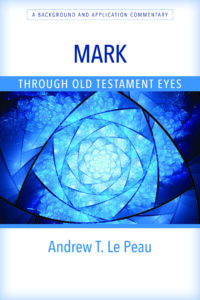How do we interpret the Bible correctly? One key is to understand the genre (type of literature) a particular book or part of a book is written in. We know poetry uses images and parables are fictional. So we don’t interpret either genre literally.
One of the most difficult Biblical genres for modern readers to understand is that of apocalyptic literature. It’s difficult because almost no one uses this genre anymore. The following excerpt from Mark Through Old Testament Eyes (pp. 233-34) offers some help.
Apocalyptic literature is a genre that typically uses prophecies and visions to describe end times or other major cataclysmic events on the world scene that have religious significance.* Common themes include hope for the future in dire times, persevering faith in the midst of suffering, and coming judgment along with the victory of God. Such literature is not necessarily about the end of all human history or of the space-time universe. Often it concerns other critical episodes where God acts in history. . . .

Such literature is also characterized by vivid—what some would consider wild—imagery and dramatic metaphor. Dragons and other fantastic beasts, for example, often make prominent appearances. The purpose of such imagery is to break us out of our limited, human perspective that mere propositions and direct, literal speech cannot achieve. By touching our emotions and imaginations, these writings move us to see God and his work in the world in fuller, deeper ways. The prophets do not want us to get lost in intellectual analysis of the details of their visions but to be profoundly transformed by the overall effect that their writings create. They want to touch the heart, not just the mind.
Daniel and Revelation are the two most prominent examples of this kind of literature in the Bible. Other Old Testament books also have some apocalyptic sections or characteristics, like Isaiah, Ezekiel, Zechariah, and Joel, as do a number of noncanonical books like Enoch and Baruch. . . .
Old Testament writers, for example, used the image of the earth or heavens shaking when God provided a victory for his people (Jdg 5:5; 2 Sa 22:8; Ps 46:6; 77:18). In none of these cases were there actual earthquakes nor did the earth melt, which we know to be the case since we are all still here. Were the prophets somehow mistaken? Was the Bible wrong? Only if we mistake the genre they were writing in.
The prophets also used this imagery of a shaking earth to describe God bringing judgment on his own people (Isa 2:19-21; 24:19-20; Jer 4:23- 24; Joel 3:16). When judgment came, it was likewise not accompanied by earthquakes but by Babylonian armies or those of other regional powers. . . .
The images of the earth or heavens shaking was used by the prophets to emphasize the magnitude of God’s action, the immensity of the change and destruction that was being described. We might call the assassination of a major world figure an “earth-shattering event.” But we do not mean the planet broke in pieces. Neither did Old Testament writers.
This is the literary and religious tradition that Jesus operates in when he answers the disciples’ questions about the destruction of the temple in Mark 13. And these are the Old Testament eyes through which the disciples would have seen his answers as well.**
As I said in the last post, the goal of reading the Bible is not to interpret it literally. The goal is to interpret it correctly. Understanding the type of literature we are reading is a great place to begin.
—
*For a fuller discussion see T. J. Johnson, “Apocalypticism, Apocalyptic Literature,” in Dictionary of the Old Testament Prophets, eds. Mark J. Boda and J. Gordon McConville (Downers Grove, IL: IVP Academic, 2012), 36-43.
**Two excellent books introducing prophetic, poetic and apocalyptic literature in the Old Testament are D. Brent Sandy, Plowshares and Pruning Hooks (Downers Grove, IL: IVP Academic, 2002) and Aaron Chalmers, Interpreting the Prophets (Downers Grove, IL: IVP Academic, 2015), the latter being somewhat more advanced.

